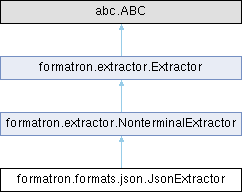Loading...
Searching...
No Matches
formatron.formats.json.JsonExtractor Class Reference
An extractor that loads json data to an object from a string. More...
Inheritance diagram for formatron.formats.json.JsonExtractor:

Public Member Functions | |
| __init__ (self, str nonterminal, typing.Optional[str] capture_name, schemas.schema.Schema|collections.abc.Sequence schema, typing.Callable[[str], schemas.schema.Schema] to_object) | |
| Create a json extractor from a given schema or a list of supported types. | |
| typing.Optional[tuple[str, schemas.schema.Schema]] | extract (self, str input_str) |
| Extract a schema instance from a string. | |
 Public Member Functions inherited from formatron.extractor.NonterminalExtractor Public Member Functions inherited from formatron.extractor.NonterminalExtractor | |
| str | nonterminal (self) |
| Get the nonterminal of the extractor. | |
| str | kbnf_reference (self) |
 Public Member Functions inherited from formatron.extractor.Extractor Public Member Functions inherited from formatron.extractor.Extractor | |
| __str__ (self) | |
| typing.Optional[str] | capture_name (self) |
Get the name of the capture, or None if the extractor does not capture. | |
Protected Attributes | |
| _to_object | |
| _rule_str | |
 Protected Attributes inherited from formatron.extractor.NonterminalExtractor Protected Attributes inherited from formatron.extractor.NonterminalExtractor | |
| _nonterminal | |
 Protected Attributes inherited from formatron.extractor.Extractor Protected Attributes inherited from formatron.extractor.Extractor | |
| _capture_name | |
Properties | |
| kbnf_definition (self) | |
Detailed Description
An extractor that loads json data to an object from a string.
Constructor & Destructor Documentation
◆ __init__()
| formatron.formats.json.JsonExtractor.__init__ | ( | self, | |
| str | nonterminal, | ||
| typing.Optional[str] | capture_name, | ||
| schemas.schema.Schema|collections.abc.Sequence | schema, | ||
| typing.Callable[[str], schemas.schema.Schema] | to_object ) |
Create a json extractor from a given schema or a list of supported types.
Currently, the following data types are supported:
- bool
- int
- positive int
- negative int
- nonnegative int
- nonpositive int - float
- positive float
- negative float
- nonnegative float
- nonpositive float - str
- optionally with min_length, max_length and pattern constraints
- length is measured in UTF-8 character number after json parsing
- Warning: too large difference between min_length and max_length can lead to enormous memory consumption!
- pattern is mutually exclusive with min_length and max_length
- pattern will be compiled to a regular expression so all caveats of regular expressions apply
- pattern currently is automatically anchored at both ends
- the generated json could be invalid if the pattern allows invalid content between the json string's quotes.
- for example,
pattern=".*"will allow '"' to appear in the json string which is forbidden by JSON standard.
- for example,
- also supports substring_of constraint which constrains the string to be a substring of a given string
- the generated json could be invalid if the given string contains invalid content when put into the json string's quotes.
- for example,
substring_of="abc\""will allow '"' to appear in the json string which is forbidden by JSON standard.- NoneType- typing.Any
- for example,
- the generated json could be invalid if the given string contains invalid content when put into the json string's quotes.
Subclasses of collections.abc.Mapping[str,T] and typing.Mapping[str,T] where T is a supported type,
- Subclasses of collections.abc.Sequence[T] and typing.Sequence[T] where T is a supported type.
- optionally with
minItems,maxItems,prefixItemsconstraints - Warning: too large difference between minItems and maxItems can lead to very slow performance!
- Warning: By json schema definition, prefixItems by default allows additional items and missing items in the prefixItems, which may not be the desired behavior and can lead to very slow performance if prefixItems is long!
- optionally with
- tuple[T1,T2,...] where T1,T2,... are supported types. The order, type and number of elements will be preserved.
- typing.Literal[x1,x2,...] where x1, x2, ... are instances of int, string, bool or NoneType, or another typing.Literal[y1,y2,...]
- typing.Union[T1,T2,...] where T1,T2,... are supported types.
- schemas.Schema where all its fields' data types are supported. Recursive schema definitions are supported as well.
- Warning: while not required field is supported, they can lead to very slow performance and/or enormous memory consumption if there are too many of them!
- Parameters
-
nonterminal The nonterminal representing the extractor. capture_name The capture name of the extractor, or Noneif the extractor does not capture.schema The schema. to_object A callable to convert the extracted string to a schema instance.
Reimplemented from formatron.extractor.NonterminalExtractor.
Member Function Documentation
◆ extract()
| typing.Optional[tuple[str, schemas.schema.Schema]] formatron.formats.json.JsonExtractor.extract | ( | self, | |
| str | input_str ) |
Extract a schema instance from a string.
- Parameters
-
input_str The input string to extract from.
- Returns
- A tuple of the remaining string and the extracted schema instance, or
Noneif extraction failed.
Reimplemented from formatron.extractor.Extractor.
◆ kbnf_definition()
| formatron.formats.json.JsonExtractor.kbnf_definition | ( | self | ) |
Reimplemented from formatron.extractor.Extractor.
Member Data Documentation
◆ _rule_str
◆ _to_object
The documentation for this class was generated from the following file:
- src/formatron/formats/json.py